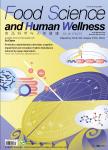Phenolic profile, antioxidant properties, and beneficial gut microbiota associated with freeze dried Lycium ruthenicum
作者机构:School of Public Health, Lanzhou University Guangdong Key Laboratory for Crop Germplasm Resources Preservation and Utilization, Agro-biological Gene Research Center, Guangdong Academy of Agricultural Sciences Institute of Animal Science, Guangdong Academy of Agricultural Sciences, Key Laboratory of Animal Nutrition and Feed Science in South China, Ministry of Agriculture and Rural Affairs, State Key Laboratory of Livestock and Poultry Breeding, Guangdong Key Laboratory of Animal Breeding and Nutrition
出 版 物:《Food Science and Human Wellness》 (食品科学与人类健康(英文))
年 卷 期:2024年
核心收录:
学科分类:1004[医学-公共卫生与预防医学(可授医学、理学学位)] 100403[医学-营养与食品卫生学] 10[医学]
基 金:the Science and Technology Program of Gansu Province (Lanzhou, China project number: 22JR5RA463) Key Research and Development Program in Tibet Autonomous Region (XZ202301ZY0018N) Collaborative Innovation Center of GDAAS (XTXM 202205)
摘 要:Black wolfberry (Lycium ruthenicum) is enriched in phytochemical metabolites which can benefit human health. However, few studies have examined the effects of different fruit drying methods on its polyphenol content, antioxidant activity, and anti-inflammatory activity. In addition, whether and how consuming dried black wolfberry affects gut microbiota has not been reported. Here, we assessed the phytochemical profile and bioactivities of black wolfberry dried through different methods, and subsequently characterized changes in human fecal microbiota associated with freeze-dried black wolfberry in vitro. The results showed that freeze-dried samples retained higher total polyphenols (49.68 ± 1.62) mg GAE/g, tannins (38.64 ± 1.35) mg GAE/g, and proanthocyanidins (3.35 ± 0.30) mg/g compared to sun drying or hot air drying (P 0.05), and exhibited higher antioxidant and anti-inflammatory activities. In bioreactor fermentations of human fecal inoculum, freeze-dried black wolfberry was associated with increased species richness and alpha diversity. At the genus level, fermentations treated with black wolfberry had higher abundance of Lactic Acid Bacteria including Lactococcus, Bifidobacterium, Lactobacillus, Pediococcus and Weissella, as well as butyrate-producing bacteria compared to the untreated samples, suggesting enrichment for taxa associated with a healthy gut microbiome. In addition, the black wolfberry treatment group had higher levels of short-chain fatty acids, which was consistent with PICRUSt2 inference. This study defines an optimal method for black wolfberry preservation to retain the beneficial compounds, and provides a foundation for further exploration of its potential benefits for human gut microbiota.



